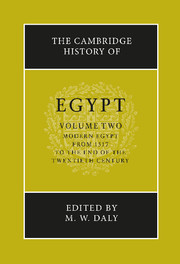Book contents
- Frontmatter
- 1 Ottoman Egypt, 1525–1609
- 2 Egypt in the seventeenth century
- 3 Egypt in the eighteenth century
- 4 Culture in Ottoman Egypt
- 5 The French occupation of Egypt, 1798–1801
- 6 The era of Muhammad ’Ali Pasha, 1805–1848
- 7 Egypt under the successors of Muhammad ’Ali
- 8 The Egyptian empire, 1805–1885
- 9 The ‘Urabi revolution and the British conquest, 1879–1882
- 10 The British occupation, 1882–1922
- 11 Social and economic change in the “long nineteenth century”
- 12 The liberal age, 1923–1952
- 13 Egypt: society and economy, 1923–1952
- 14 Republican Egypt interpreted: revolution and beyond
- 15 Modern Egyptian culture in the Arab world
- Select Bibliography
- Index
- References
14 - Republican Egypt interpreted: revolution and beyond
Published online by Cambridge University Press: 28 March 2008
- Frontmatter
- 1 Ottoman Egypt, 1525–1609
- 2 Egypt in the seventeenth century
- 3 Egypt in the eighteenth century
- 4 Culture in Ottoman Egypt
- 5 The French occupation of Egypt, 1798–1801
- 6 The era of Muhammad ’Ali Pasha, 1805–1848
- 7 Egypt under the successors of Muhammad ’Ali
- 8 The Egyptian empire, 1805–1885
- 9 The ‘Urabi revolution and the British conquest, 1879–1882
- 10 The British occupation, 1882–1922
- 11 Social and economic change in the “long nineteenth century”
- 12 The liberal age, 1923–1952
- 13 Egypt: society and economy, 1923–1952
- 14 Republican Egypt interpreted: revolution and beyond
- 15 Modern Egyptian culture in the Arab world
- Select Bibliography
- Index
- References
Summary
Egypt is one of a restricted group of developing countries whose politics have assumed a special significance as test cases of opposing models of development. Egypt shares with India, China, Algeria, Yugoslavia and Cuba the analytical interest of partisan and academic observers for the light its experience may shed upon the competing theories of development and for the possibility that its history may reveal a unique and unanticipated model
Leonard Binder, In a Moment of Enthusiasm, p. i.Introduction
Towards the end of the 1970s, as the opening up (infitah) toward the west and the liberalization of the economy were sharply criticized as “betrayal” of the 1952 revolution’s goals, as return of the exploitative bourgeoisie, and as abandonment of the Palestinian cause, certain observers, Egyptian and foreign, began to lay out a new “model” for the reading of contemporary Egyptian history. This model attempted to view Egypt’s various “experiments,” before and after the revolution, from a common perspective; it also made it possible to explain the “cycles” through which Egypt has ultimately failed to “modernize” and regain the place among nations that its millenia of history allows it to demand. Muhammad ‘Ali and Nasir, breaking with a past of national humiliation, both incarnated Egypt’s “will to power” by basing restoration of its regional and international role on a state economy heavily reliant on industry and the construction of a national armed force: the failure of both projects was brought about by conjunction of the “perverse” consequences of their own options and methods, and by the hostility from coalitions of external interests, alarmed by the regional role to which Egypt aspired. The successors of Muhammad ‘Ali and Nasir, Isma’il and Sadat, both betrayed or distorted their predecessors’ “developmentalist” aims and sacrificed the public good and Egypt’s independence to the mercantile interests of a class of speculators and unscrupulous businessmen that served as a wedge for foreign penetration. The crucial point here is the repetition itself and the way these successive “cycles” may be articulated: Nasir “repeats” Muhammad ‘Ali, precisely because, under Isma’il, the work of his grandfather had been swayed from its objectives; in the same way, if Sadat “repeats” Isma’il, it is because the conditions that had led to Muhammad ‘Ali’s failure were still in force, producing the same effects, and enabling the articulation of something that may appear as a “law” pertaining to the specific history of Egypt.
- Type
- Chapter
- Information
- The Cambridge History of Egypt , pp. 334 - 393Publisher: Cambridge University PressPrint publication year: 1998
References
- 6
- Cited by



